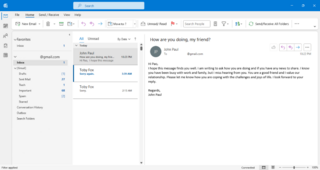
Spamming is the use of messaging systems to send multiple unsolicited messages (spam) to large numbers of recipients for the purpose of commercial advertising, for the purpose of non-commercial proselytizing, for any prohibited purpose, or simply repeatedly sending the same message to the same user. While the most widely recognized form of spam is email spam, the term is applied to similar abuses in other media: instant messaging spam, Usenet newsgroup spam, Web search engine spam, spam in blogs, wiki spam, online classified ads spam, mobile phone messaging spam, Internet forum spam, junk fax transmissions, social spam, spam mobile apps, television advertising and file sharing spam. It is named after Spam, a luncheon meat, by way of a Monty Python sketch about a restaurant that has Spam in almost every dish in which Vikings annoyingly sing "Spam" repeatedly.

Kuro5hin was a collaborative discussion website founded by Rusty Foster in 1999, having been inspired by Slashdot. Articles were created and submitted by users and submitted to a queue for evaluation. Site members could vote for or against publishing an article and once the article had reached a certain number of votes, it was published to the site or deleted from the queue. The site has been described as "a free-for-all of news and opinion written by readers". Around 2005, its membership numbered in the tens of thousands.

Microsoft Outlook is a personal information manager software system from Microsoft, available as a part of the Microsoft 365 software suites. Though primarily being popular as an email client for businesses, Outlook also includes functions such as calendaring, task managing, contact managing, note-taking, journal logging, web browsing, and RSS news aggregation.
Social software, also known as social apps or social platform includes communications and interactive tools that are often based on the Internet. Communication tools typically handle capturing, storing and presenting communication, usually written but increasingly including audio and video as well. Interactive tools handle mediated interactions between a pair or group of users. They focus on establishing and maintaining a connection among users, facilitating the mechanics of conversation and talk. Social software generally refers to software that makes collaborative behaviour, the organisation and moulding of communities, self-expression, social interaction and feedback possible for individuals. Another element of the existing definition of social software is that it allows for the structured mediation of opinion between people, in a centralized or self-regulating manner. The most improved area for social software is that Web 2.0 applications can all promote co-operation between people and the creation of online communities more than ever before. The opportunities offered by social software are instant connections and opportunities to learn.An additional defining feature of social software is that apart from interaction and collaboration, it aggregates the collective behaviour of its users, allowing not only crowds to learn from an individual but individuals to learn from the crowds as well. Hence, the interactions enabled by social software can be one-to-one, one-to-many, or many-to-many.
A trackback allows one website to notify another about an update. It is one of four types of linkback methods for website authors to request notification when somebody links to one of their documents. This enables authors to keep track of who is linking to their articles. Some weblog software, such as SilverStripe, WordPress, Drupal, and Movable Type, supports automatic pingbacks where all the links in a published article can be pinged when the article is published. The term is used colloquially for any kind of linkback.
Spam in blogs is a form of spamdexing which utilizes internet sites which allow content to be publicly posted, in order to artificially inflate their website ranking by linking back to their web pages. Backlink helps search algorithms determine the popularity of a web page, which plays a major role for search engines like Google and Microsoft Bing to decide a web page ranking on a certain search query. This helps the spammer's website to list ahead of other sites for certain searches, which helps them to increase the number of visitors to their website.
The social web is a set of social relations that link people through the World Wide Web. The social web encompasses how websites and software are designed and developed in order to support and foster social interaction. These online social interactions form the basis of much online activity including online shopping, education, gaming and social networking services. The social aspect of Web 2.0 communication has been to facilitate interaction between people with similar tastes. These tastes vary depending on who the target audience is, and what they are looking for. For individuals working in the public relation department, the job is consistently changing and the impact is coming from the social web. The influence held by the social network is large and ever changing.
Social bookmarking is an online service which allows users to add, annotate, edit, and share bookmarks of web documents. Many online bookmark management services have launched since 1996; Delicious, founded in 2003, popularized the terms "social bookmarking" and "tagging". Tagging is a significant feature of social bookmarking systems, allowing users to organize their bookmarks and develop shared vocabularies known as folksonomies.
Norton Internet Security, developed by Symantec Corporation, is a discontinued computer program that provides malware protection and removal during a subscription period. It uses signatures and heuristics to identify viruses. Other features include a personal firewall, email spam filtering, and phishing protection. With the release of the 2015 line in summer 2014, Symantec officially retired Norton Internet Security after 14 years as the chief Norton product. It was superseded by Norton Security, a rechristened adaptation of the Norton 360 security suite.

In computing, a news aggregator, also termed a feed aggregator, content aggregator, feed reader, news reader, RSS reader, or simply an aggregator is client software or a web application that aggregates digital content such as online newspapers, blogs, podcasts, and video blogs (vlogs) in one location for easy viewing. The updates distributed may include journal tables of contents, podcasts, videos, and news items.
nofollow is a setting on a web page hyperlink that directs search engines not to use the link for page ranking calculations. It is specified in the page as a type of link relation; that is: <a rel="nofollow" ...>. Because search engines often calculate a site's importance according to the number of hyperlinks from other sites, the nofollow setting allows website authors to indicate that the presence of a link is not an endorsement of the target site's importance.

Blue Frog was a freely-licensed anti-spam tool produced by Blue Security Inc. and operated as part of a community-based system which tried to persuade spammers to remove community members' addresses from their mailing lists by automating the complaint process for each user as spam is received. Blue Security maintained these addresses in a hashed form in a Do Not Intrude Registry, and spammers could use free tools to clean their lists. The tool was discontinued in 2006.
Outpost Firewall Pro is a discontinued personal firewall developed by Agnitum.

The Megaphone desktop tool was a Windows "action alert" tool developed by Give Israel Your United Support (GIYUS) and distributed by World Union of Jewish Students, World Jewish Congress, The Jewish Agency for Israel, World Zionist Organization, StandWithUs, Hasbara fellowships, HonestReporting, and other pro-Israel public relations organizations. The tool was released in July during the 2006 Lebanon War. By June 2011, the tool was no longer available through the GIYUS website. An RSS newsfeed is available.
A social news website is a website that features user-posted stories. Such stories are ranked based on popularity, as voted on by other users of the site or by website administrators. Users typically comment online on the news posts and these comments may also be ranked in popularity. Since their emergence with the birth of Web 2.0, social news sites have been used to link many types of information, including news, humor, support, and discussion. All such websites allow the users to submit content and each site differs in how the content is moderated. On the Slashdot and Fark websites, administrators decide which articles are selected for the front page. On Reddit and Digg, the articles that get the most votes from the community of users will make it to the front page. Many social news websites also feature an online comment system, where users discuss the issues raised in an article. Some of these sites have also applied their voting system to the comments, so that the most popular comments are displayed first. Some social news websites also have a social networking service, in that users can set up a user profile and follow other users' online activity on the website.

Digg, stylized in lowercase as digg, is an American news aggregator with a curated front page, aiming to select stories specifically for the Internet audience such as science, trending political issues, and viral Internet issues. It was launched in its current form on July 31, 2012, with support for sharing content to other social platforms such as Twitter and Facebook.
Social Network Automation refers to tools that are used to semi/automate the process of posting content to social networking and social bookmarking websites. Tools can range from mostly manual and free to semi-automated tools which are either commercial standalone software or paid subscriptions.

Sproose was a consumer search engine launched in August 2007 by founder Bob Pack. Sproose provided web search results from partners including MSN, Yahoo! and Ask.com. Sproose intended to have better-quality results than algorithmic search engines because its users were able to influence the ranking order of the search results by voting for websites and deleting bad or spam results. It had been compared to Digg and Mahalo.com, among other social search websites.

A controversy surrounding the AACS cryptographic key arose in April 2007 when the Motion Picture Association of America and the Advanced Access Content System Licensing Administrator, LLC began issuing cease and desist letters to websites publishing a 128-bit (16-byte) number, represented in hexadecimal as 09 F9 11 02 9D 74 E3 5B D8 41 56 C5 63 56 88 C0, a cryptographic key for HD DVDs and Blu-ray Discs. The letters demanded the immediate removal of the key and any links to it, citing the anti-circumvention provisions of the United States Digital Millennium Copyright Act (DMCA).
People tend to be a lot less bothered by spam slipping through filters into their mail box than having desired e-mail ("ham") blocked. Trying to balance false negatives and false positives is a critical aspect for a successful anti-spam system. Because servers are not able to block all spam, there are multiple methods for individual users to allow users to control this balance.








